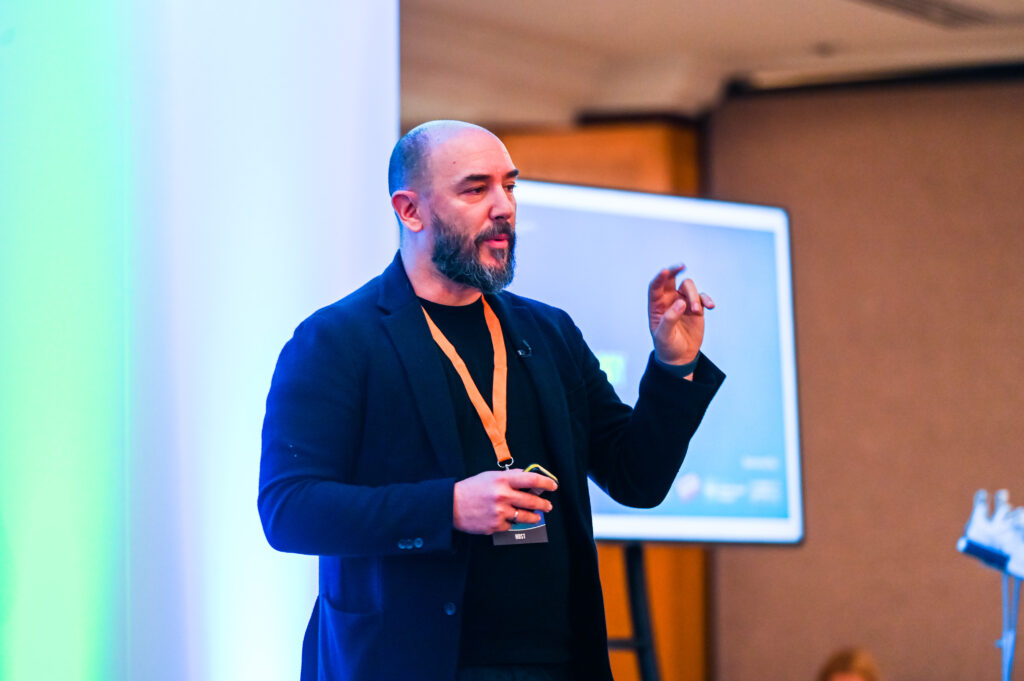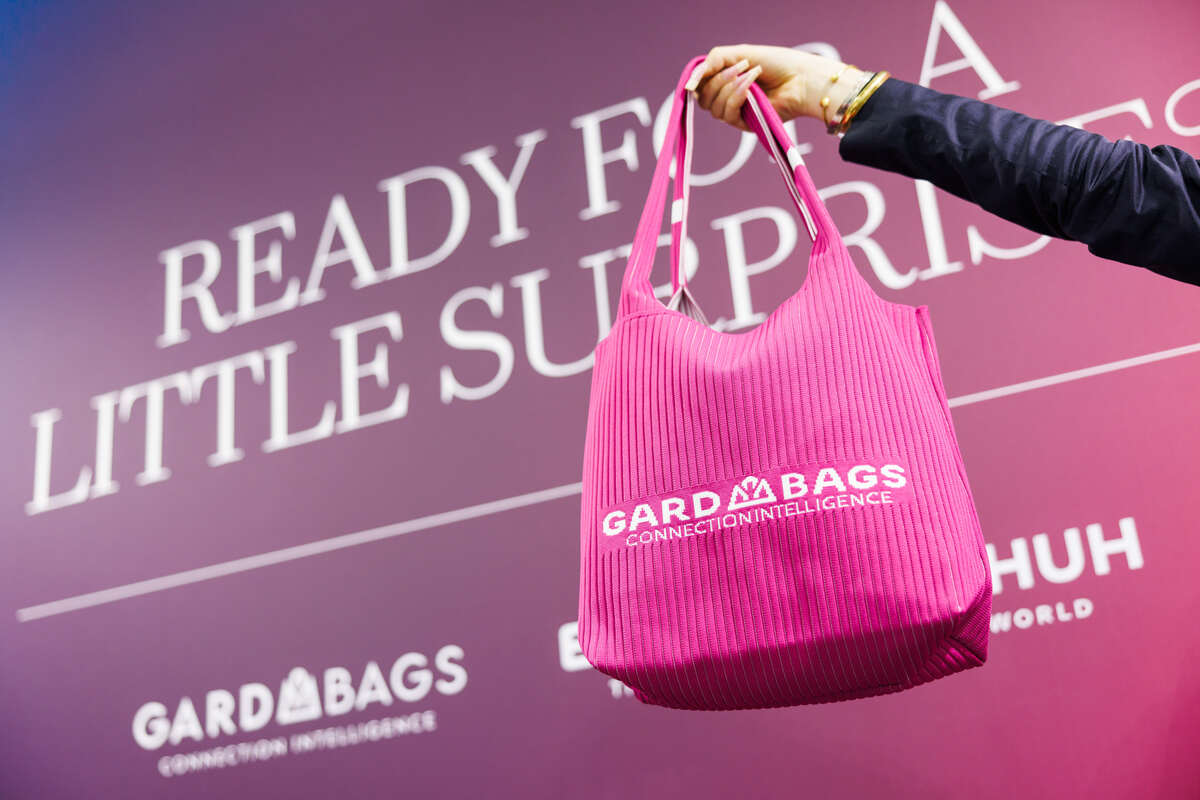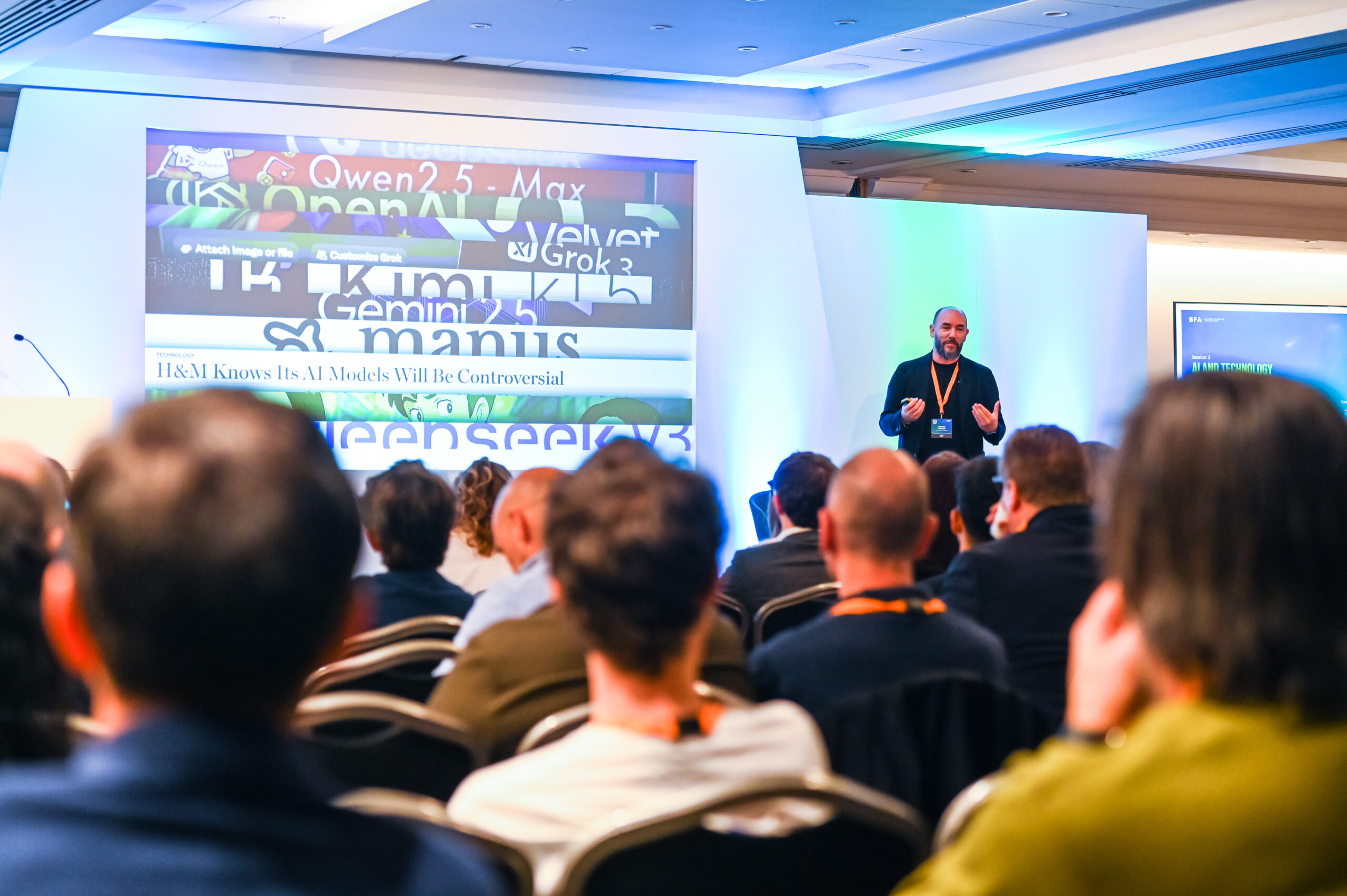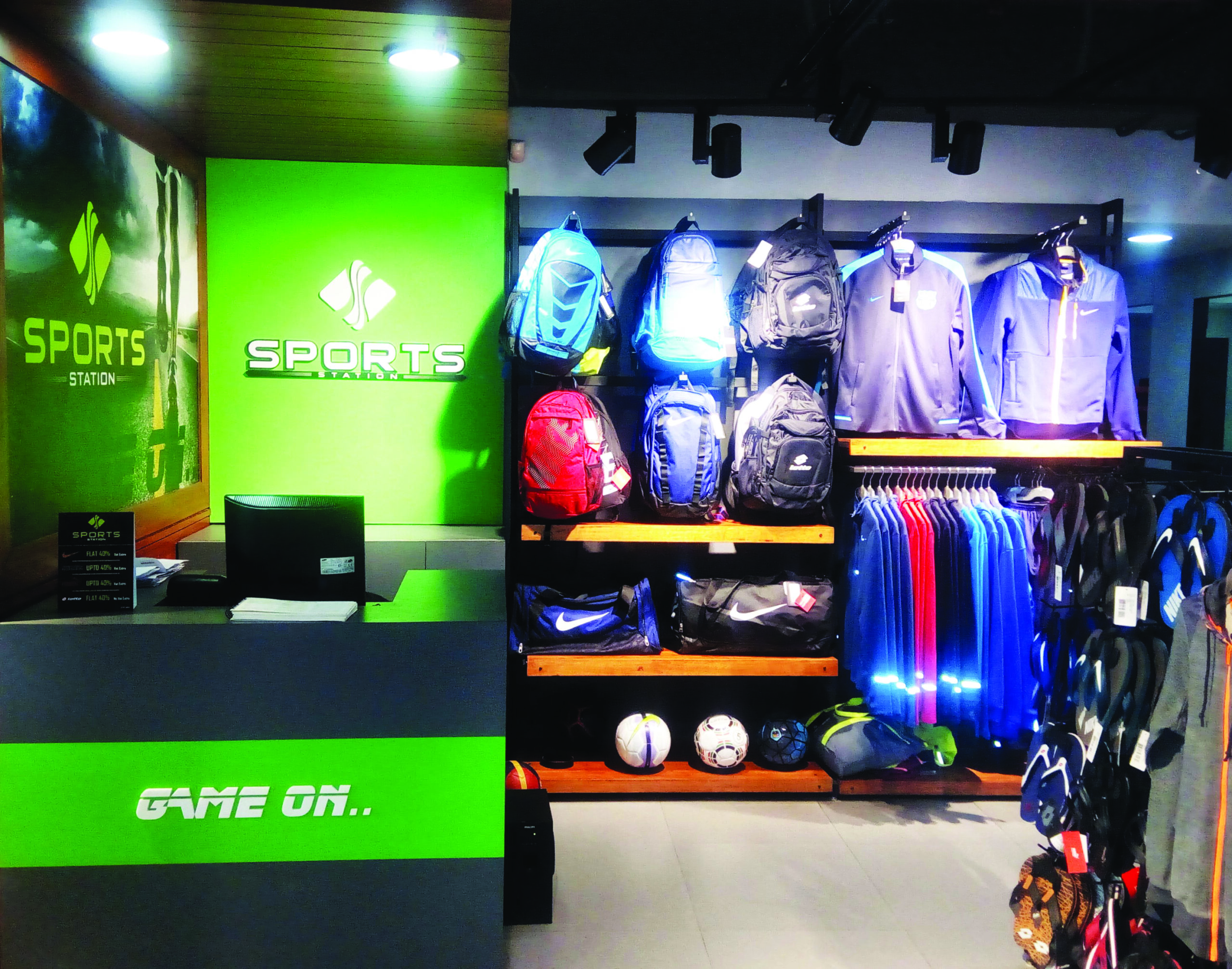Credit : Exporiva schuh & Gardabags
ARTIFICIAL INTELLIGENCE IS TRANSFORMING THE FOOTWEAR INDUSTRY, OPTIMISING PRODUCTION, LOGISTICS AND CUSTOMER EXPERIENCE IN A SUSTAINABLE AND PERSONALISED WAY. DURING THE SUSTAINABILITY SUMMIT, THE IMPORTANCE OF LEARNING, UNLEARNING AND RE-LEARNING TO REMAIN COMPETITIVE IN A RAPIDLY CHANGING ENVIRONMENT EMERGED. INNOVATIVE START-UPS SUCH AS SANGROVE, IFRETURNS, ACBC AND UP2U SHOW HOW AI CAN BE A CONCRETE LEVER FOR CHANGE AND VALUE.
With remarkable foresight, futurist Alvin Toffler declared in the 1980s: “The illiterate of the 21st century will not be those who cannot read and write, but those who cannot learn, unlearn, and relearn.”
The quote was chosen by Alberto Mattiello, member of the Scientific Committee of Expo Riva Schuh and Gardabags, to close his presentation on artificial intelligence and technology in the footwear industry, delivered on 3 April in Birmingham during the Sustainability Summit organised by the British Footwear Association.

The Riva del Garda exhibition has always worked to ensure its event is not only the most important international business platform for footwear and accessories, but also a hub for relationships, information, ideas and innovation.
Over the years, nearly 60 startups have been invited to take part in the Innovation Village Retail – a recurring feature at Expo Riva Schuh and Gardabags, which will return from 14 to 17 June 2025 – offering insights and real opportunities to transform and grow the footwear and accessories distribution business.
An investment in research and “consultation” that has earned recognition beyond the exhibition itself, as demonstrated by the invitation to participate in the Sustainability Summit as speakers.
And if Toffler foresaw that the ability to quickly adapt to change would become an essential skill, today that ability is more crucial than ever in the current technological and industrial landscape, often forcing professionals to rethink traditional processes.
In the next 10 years, we will have access to such advanced computational power that we’ll be able to digitally simulate any aspect of our current world. In the past two years alone, the cost of AI has dropped by an estimated 99.6%. There are now more than 30,000 AI applications already available online.
Even looking at these figures alone, it becomes clear that this dense network of innovation and potential is well worth exploring.
BUT DOES THE FOOTWEAR INDUSTRY REALLY NEED ARTIFICIAL INTELLIGENCE?
Long a symbol of craftsmanship, style and local identity, the footwear industry now finds itself in the midst of a profound transformation. Mounting pressure for sustainable production models, the demand for greater operational efficiency and shifting consumer expectations are driving a complete rethink of the entire value chain. In this context, artificial intelligence is emerging not merely as a technological aid, but as a true catalyst for innovation.
AI enables a deep re-engineering of processes – from product conception to distribution and post-sales management. The goal is not just to produce better and faster, but to design a footwear system that is more resilient, more responsible and more tailored to individual needs.
Yet navigating the maze of new technologies and daily innovations – some headline-grabbing, others less so – is no easy task. Here, we aim to explore some of the key areas where AI is being applied in the footwear business, while also highlighting a number of promising startups and emerging technologies that are reshaping the face of the industry.
AI IN THE PRODUCTION CHAIN: OPTIMISATION, EFFICIENCY AND PERSONALISATION
One of the key benefits of integrating AI into the footwear industry lies in the ability to optimise every stage of the production process. Machine learning algorithms analyse vast quantities of data to streamline material flows, reduce waste and improve resource management. In particular, predictive AI systems enable production planning that closely matches real market demand, helping to minimise the risks of overproduction and obsolescence.

3D printing, when combined with generative design tools, allows for fast and cost-effective footwear prototyping. Artificial intelligence supports the precise modelling of each component, recommending geometries that maximise material efficiency, performance and durability. This approach also encourages personalisation – a growing trend in today’s market.
Another important advantage is energy efficiency: Smart facilities equipped with connected sensors and AI-driven software can optimise energy use in real time, enabling a more environmentally sustainable production process.
WHAT THE MARKET OFFERS
We’ve highlighted some practical, AI-based solutions that are already available, designed to help companies improve their approach to both production and sales. These innovations come from startups that, over the years, have brought energy and ideas to the Innovation Village Retail at Expo Riva Schuh and Gardabags.
SANGROVE: Optimising Production
One of the startups that gained visibility and had the opportunity to present its technology during the Sustainability Summit was Sangrove. The New York-based company operates at the crossroads of retail and sustainable technology, with the goal of reducing overproduction and excess inventory in the consumer goods sector – particularly fashion. Their digital platform, called IMPACT SHOPPING™, uses advanced technologies and AI to aggregate consumer demand and coordinate production based on pre-orders. This approach allows brands to produce only what is truly needed, helping to eliminate waste and reduce CO₂ emissions associated with overproduction.
IFRETURNS: The Startup Redefining Returns Logistics
In e-commerce, returns remain one of the most critical challenges in terms of cost, logistics and environmental impact. This is especially true in the footwear industry, where issues related to fit often lead consumers to order multiple sizes or models, fully intending to return part of their purchase. IFRETURNS tackles the problem with a radically new approach.
Using an AI-powered platform, IFRETURNS transforms returns management into an opportunity for conversion and customer loyalty. The system guides the user through a simplified three-click process, offering alternative product suggestions and encouraging exchanges rather than refunds. By using optimised collection points, it reduces unnecessary transportation, improving the environmental impact as well.
The platform incorporates personalised recommendation modules, which analyse user preferences and purchasing behaviour to suggest alternatives that better match expectations. The IFRETURNS approach is a win-win: the customer more easily finds what they’re looking for, the brand reduces their financial losses, and the environment benefits from a more efficient logistics process.
ACBC: Smart Materials and Circular Design
While IFRETURNS focuses on logistics and the post-sale experience, ACBC works further upstream – on the product and its materials. Founded in Italy, the company has built its success on a blend of consultancy and direct production, helping more than 100 brands improve their sustainability. At the heart of its strategy lies the adoption of biodegradable and innovative materials, selected and combined using artificial intelligence.
AI is used to analyse the composition, durability, environmental impact and recyclability of dozens of materials, identifying the most effective combinations for specific use cases. ACBC has developed solutions such as ZIPSHOES – modular footwear designed for durability and easy recycling – and collaborates with research labs to introduce biodegradable foams into sports products.
As a certified B Corp, ACBC also distinguishes itself through its values. To this end, AI is not just a technical tool, but a true ally – guiding ethical, long-term choices, translating environmental complexity into usable data.
UP2U: AI and Strategy for Companies Ready to Change
UP2U speaks to a different audience: businesses that want to begin their journey towards sustainability but lack the skills or tools to make it happen. Their platforms –Climax, Choral and Planet – use artificial intelligence to measure CO₂ emissions, monitor ESG progress and train staff on sustainability topics.
The approach is strongly data-driven: AI enables the creation of tailored, dynamic action plans that update in real time based on regulatory developments, market changes or stakeholder feedback.
UP2U’s strength lies in its ability to translate sustainability into competitive value, using technology that’s accessible even to SMEs.
CUSTOMER EXPERIENCE: AI AS A BRIDGE BETWEEN DIGITAL AND PHYSICAL
In a market shaped by multichannel retail, delivering a consistent and personalised experience is a complex challenge. AI plays a central role in building seamless, unique customer journeys. By profiling users, AI technologies can recommend styles, colours and sizes based on personal taste, biometric measurements and previous feedback.
Virtual fitting rooms and 3D foot-scanning apps are significantly reducing return rates while also boosting customer satisfaction. Smart recommendations powered by deep-learning algorithms increase the likelihood of purchase and enhance brand loyalty.
Even the post-sale relationship can be managed by AI: smart chatbots, predictive support, personalised notifications and care tips create a digital ecosystem that strengthens the customer relationship.
EMERGING TECHNOLOGIES: DEEP RESEARCH, VIBE CODING AND SMART FOOTWEAR
Among the most promising technologies, Deep Research allows companies to map the market, analyse competitors and identify emerging trends at a speed and depth previously unimaginable. AI systems scan millions of sources in real time, generating insights that support strategic decision-making.
Vibe Coding, on the other hand, enables software development through natural language. This empowers non-programmers – designers, marketers and product managers alike – to create digital tools for personalisation, sales or sustainable management. An important step forward in the market’s digital transformation.
Finally, the integration of AI directly into shoes – smart footwear – opens up fascinating possibilities: shoes that adapt in real time to the shape of the foot, track physical activity and provide feedback to the wearer. These products are poised to become more than just fashion accessories, evolving into genuine tools for well-being and performance.
TOWARDS A NEW ERA FOR THE FOOTWEAR INDUSTRY
Artificial intelligence is reshaping the footwear business from every angle: production, commerce, customer relations and ethics. Companies that manage to integrate these technologies with clarity of vision and a sense of responsibility will secure a strong competitive advantage.
The shift towards a more sustainable, efficient and personalised model is not only possible – it is essential. The stories of SANGROVE, IFRETURNS, ACBC and UP2U show that innovation and sustainability are not only compatible, but mutually reinforcing.
The revolution has already begun. It’s now up to entrepreneurs, designers, engineers and policymakers to recognise its potential and lead the change – towards a smarter, more inclusive and circular future for the footwear industry.
And to explore it further, all you have to do is attend Expo Riva Schuh and Gardabags. Discover the next wave of startups in the Innovation Village Retail area, delve into consumer trends in the Highlights zone, explore market challenges through the Market Focus, and experience the new, forward-looking exhibition format of Gardabags.












